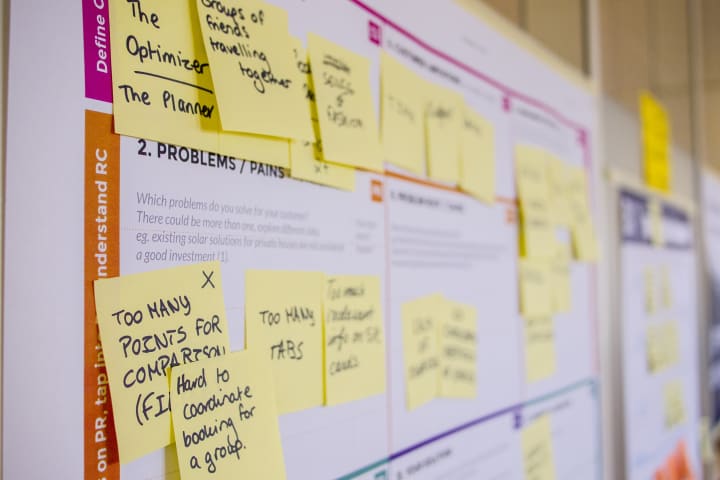Best Study Tips for Verbal Learners
Take advantage of your strengths with these study tips for verbal learners.

In the pursuit of education, many students struggle to find their stride simply because they don't have a firm grasp on their own learning style. Sadly, this often leads to a disdain for education that could otherwise be easily avoided. These students' issues are often the result of a misguided approach to studying.
There is a broad variety of categorizations for learning styles, but the most widely recognized are visual, physical, and verbal learning. Once you understand which category best matches your own learning style, you can tailor your studies to best fit your strengths.
In this article, I'm focusing specifically on the verbal learning style and providing study tips for verbal learners.
How To Determine If You Are a Verbal Learner

Photo by João Silas on Unsplash
Before undertaking these study tips for verbal learners, you want to make sure that you actually are one! There are a number of simple tests you can perform on yourself in order to determine if you are a verbal learner or if you're more at home in one of the other learning styles, such as visual or physical.
Do you find yourself expressing yourself through words often? Whether spoken or written, verbal learners find it easiest to talk through their feelings or ideas. For example, if you keep a journal or a blog, you might be a verbal learner. If instead of a journal, you prefer to draw pictures in your notebook, that may be a sign that you are more of a visual learner instead.
In addition to writing, verbal learners tend to enjoy reading anything from books and poetry to news and articles. Verbal learners might be interested in public speaking or debating, and enjoy learning new words.
Record your instructor's words.

Photo by Tra Nguyen on Unsplash
One of the easiest study tips for verbal learners to implement is something that many students already do without realizing it: write down what your teacher or professor is saying. This is a little more in-depth than simply taking notes, as it requires you to be a more active listener during classes.
A great way to implement this technique is to make an audio recording of your lessons and lectures, then refer back to it when you study. Listen back to the recording and write down exactly what the instructor says. This is especially useful if you are a slow writer, as you can rewind and make sure you don't miss anything.
Restate lessons in your own words.

Photo by Andisheh A on Unsplash
If you're implementing all of these study tips for verbal learners and recording your lessons and classes, the next step is to put these lessons in your own words. You may find it easier to write them down in your notebook or record yourself talking through the lesson. Either way, go back and read or listen to the way you phrased the lesson and determine if it makes sense. For many students, however, it can be hard to be objective when listening to the way we phrase things, which brings us to one of the most important tips for studying...
Study in a group.

Photo by Marvin Meyer on Unsplash
Working in a group isn't just one of the best study tips for verbal learners, it's actually one of the best study tips for all learning styles. You and your peers can work together to pinpoint each other's strengths and weaknesses, taking steps to highlight the former and overcome the latter.
The tricky part is figuring out each other's learning styles, but it shouldn't be too difficult to determine at least whether someone is more of a visual or verbal learner: visual learners prefer images and making diagrams while verbal learners prefer reading and writing. The good news is that the right techniques can give you a productive study session whether it's with a fellow verbal learner or with a visual learner.
Study with Another Verbal Learner

Photo by Alexis Brown on Unsplash
If you find yourself a partner or partners with the same learning style as you, you can work as a group to take advantage of these study tips for visual learners. Take turns talking through your lessons and teaching each other excerpts from your class or from your textbook. For example, put a concept into your own words or even read your notes out loud to each other.
A group of verbal learners may even find it beneficial simply to talk through a lesson. Have a conversation about what you took away from a particular lecture or textbook chapter, making sure to take notes of your partner's findings. You should also make sure to make an audio recording of your study session so you can go back and listen through it to make sure you don't forget anything.
Studying with a Visual Learner

Photo by Daria Nepriakhina on Unsplash
If you partner with a visual learner, they likely won't gain as much from these study tips for verbal learners as you do. If you're willing to get creative, however, you and your partner can teach each other in ways that complement your individual learning styles.
The biggest difference between visual and verbal learning styles is that visual learners understand better through charts and graphs and diagrams while a verbal learner prefers reading and writing and talking through concepts.
With this difference in mind, take turns presenting the information to each other in ways that make sense to you. For example, pick out one idea or topic and prepare a few sentences to describe it. Meanwhile, your visual learner partner will take the same topic and describe it by drawing a chart of diagram. Then, you and your partner can take turns presenting the information to each other. Do this until you both have a good understanding on the subject matter.
Put abstract concepts into words.

Photo by rawpixel on Unsplash
One of my best study tips for verbal learners is to put abstract concepts into words. This technique can be particularly challenging depending on the subject, but it is commensurately rewarding. Any time you come across a new topic or an idea you're unfamiliar with, take a moment and write a paragraph about it or talk through it out loud either by yourself or with a partner. Make this your standard practice, and you'll grow more and more adept at taking advantage of your strengths.
When you were in elementary school, did you ever learn the song "Fifty Nifty United States?" Possibly the best mnemonic device ever devised, this song has been helping Americans remember the names of all fifty states since it was composed in 1960 by the "Other" Ray Charles. One of the best study tips for verbal learners is to use similar techniques to remind themselves of facts and figures by setting them to rhymes or short songs.
Against my best efforts, I still remember the quadratic formula thanks to a song my Algebra II teacher taught me when I was a freshman in high school. Sung to the tune of "Pop Goes the Weasel": X equals negative B plus or minus the square root of B squared minus 4AC, all over 2A.
This technique falls short when it comes to more complex or verbose topics. In other words, you're not going to be able to write an essay on the Israeli-Palestinian conflict just by remembering something to the tune of "Pop Goes the Weasel." But this technique can be extremely effective in remembering small rules, such as math formulas, science concepts, and grammar conventions.
Meet with your instructor one-on-one.

Photo by Nik MacMillan on Unsplash
The idea of "needing extra help" has an extremely unfortunate stigma. Oftentimes students will avoid meeting with a tutor or visiting a professor during office hours simply because they don't want to seem dumb. In reality, the dumbest thing a student can do is to make their lives more difficult by avoiding additional assistance.
Verbal learners can find themselves struggling in math and science courses. Math-based classes often consist of the instructor facing away from the students, writing problem after problem on the chalkboard. This leads to more symbols and fewer words, making study tips for verbal learners especially valuable for these sorts of classes.
If you're a verbal learner and you find yourself in situations like these, the best move for you is to have a one-on-one meeting with the class instructor or a tutor. At the very least, find a friend who is strong in that particular subject. In a one-on-one meeting, your instructor or tutor is free to spend as much time as necessary to talk through the concepts until you have a sufficient grasp on the information.
Understand your strengths.

Photo by Patrick Tomasso on Unsplash
One of the most important study tips for visual learners is not to be discouraged by tough concepts. If you're having trouble wrapping your head around a visual aid like a complex graph, don't give up on it. Embrace the techniques that are comfortable for you like reading and writing. Write out a paragraph describing the graph in your own words. If you still find yourself lost, try talking it through with a friend. Whether your friend is a visual or verbal learner, you'll both come out with a deeper understanding of whatever concept you're trying to study.
About the Creator
Joseph D. N. Kendrick
Writer of words. Haver of cats. joeykendrick.com






Comments
There are no comments for this story
Be the first to respond and start the conversation.